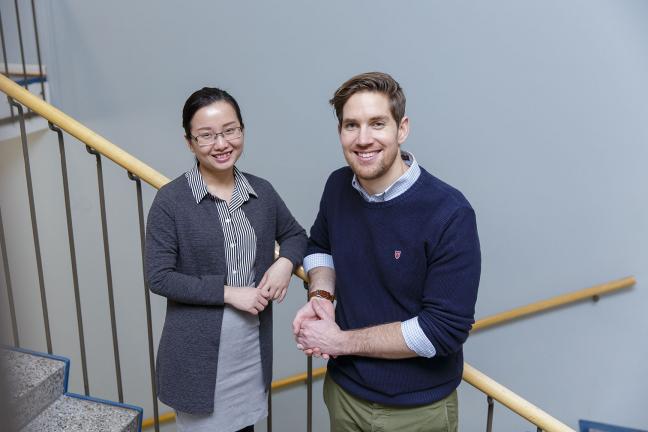Foreign talent for Finnish companies
Duyen Huynh from Vietnam came to Finland in 2015 to do a degree in Quantitative Finance at Hanken. An expert in modelling financial-market data for the trading of options and derivatives, Huynh had been concerned about finding a job in Finland after completing her studies in 2017. This changed when she was introduced to Hanken International Talent (HIT), an initiative that connects the university’s high-performing foreign students with mentors at Finnish companies looking for international expertise.
“When I started my Master’s degree at Hanken, I was already wondering what I would be able to do afterwards, as many people had told me that it’s difficult to find a job in Finland,” she says. “So Hanken International Talent came along at the right time and helped me a lot.”
Through the HIT initiative, Huynh found an on-the-job mentor at KPMG Finland, which eventually led to a traineeship role with the company. Today, she uses her coding skills to help KPMG grow its automation and machine learning initiatives, developing new technologies that both improve internal processes and can be sold on to customers.
International talent, local opportunities
Huynh’s concerns about finding a job are shared by many foreigners living in Finland. Language and cultural barriers can be difficult to overcome, and foreigners may lack the informal connections and job-market exposure that can lead to employment. Hanken is tackling this challenge head on with HIT, an initiative that has been running since 2017.
Guided by a personal mentor at participating companies, students experience professional development and personal growth in parallel to their studies, while the companies benefit from the students’ skillsets and international perspective. HIT is now well established at Fazer, KPMG, PWC, Stora Enso, Wärtsilä and several other companies.

Sonja Manninen, Head of Talent Acquisition at KPMG Finland, sees HIT as one of the ways to bring in expertise the company is not able to find in the Finnish workforce.
“We decided to get involved because today’s business environment requires a versatile talent base,” she says. “Diversity brings different kinds of knowledge into the company and enables everyone to learn something new.”
“We have a huge trainee programme that has been running for more than ten years. But it was through HIT that we hired Duyen, one of our first international trainees.”
From Detroit to Helsinki
Jordan Lawrence, from the US city of Detroit, is another HIT success story. He moved to Finland in 2017 when his American wife was offered a job in Helsinki. Lawrence was soon accepted at Hanken for a Master’s Degree in Business Administration, but also had concerns about finding a job in Finland.
“Many of my American friends here have had a hard time finding work, so I was very worried about it,” he says. “But during the HIT launch at Hanken two years ago I met with a few different companies and was then offered a job at Fazer.”
While the HIT mentorship program does not guarantee employment at participating companies, in Lawrence’s case it quickly led to a job as a trainee in the Finnish confectionary giant’s digital transformation team. Projects he’s worked on include the use of digital tools to improve supply-chain traceability and transparency, and looking at ways to increase collaborative methods inside the organization.
“Fazer’s decision to engage with HIT was specifically related to its commitment to increase university partnership,” says Lawrence. “It’s all part of the company pushing itself in a more international direction, and becoming more youthful and connected.”
Lawrence’s mentor at Fazer was the company’s Head of Digital Transformation, Juho Friberg. He saw HIT as a way to both bring fresh thinking and an extra pair of hands into his team.
“I needed someone to start working on a specific project, so I met with Jordan and the fit seemed really good right from the start,” says Friberg. “HIT is a great way to get new insights and ideas, as well as concrete help in actual daily work and projects.”
Working while studying
In their first year at participating companies, HIT students typically work with their mentors to set up a two-year plan. On-the-job training takes the student into the second year, which is often centred around Master’s thesis planning and execution – bringing value to both the student and the participating company.
“HIT is an excellent initiative, especially when it comes to recruiting students with digital expertise,” says KPMG’s Manninen. “The collaboration with Hanken has always been really smooth, and we’ll certainly continue to be involved.”
Text written by: Andrew Flowers

Photo: Patrik Lindström
This is an article from the Hanken Magazine 1/2019. Please read the whole magazine by following this link.

